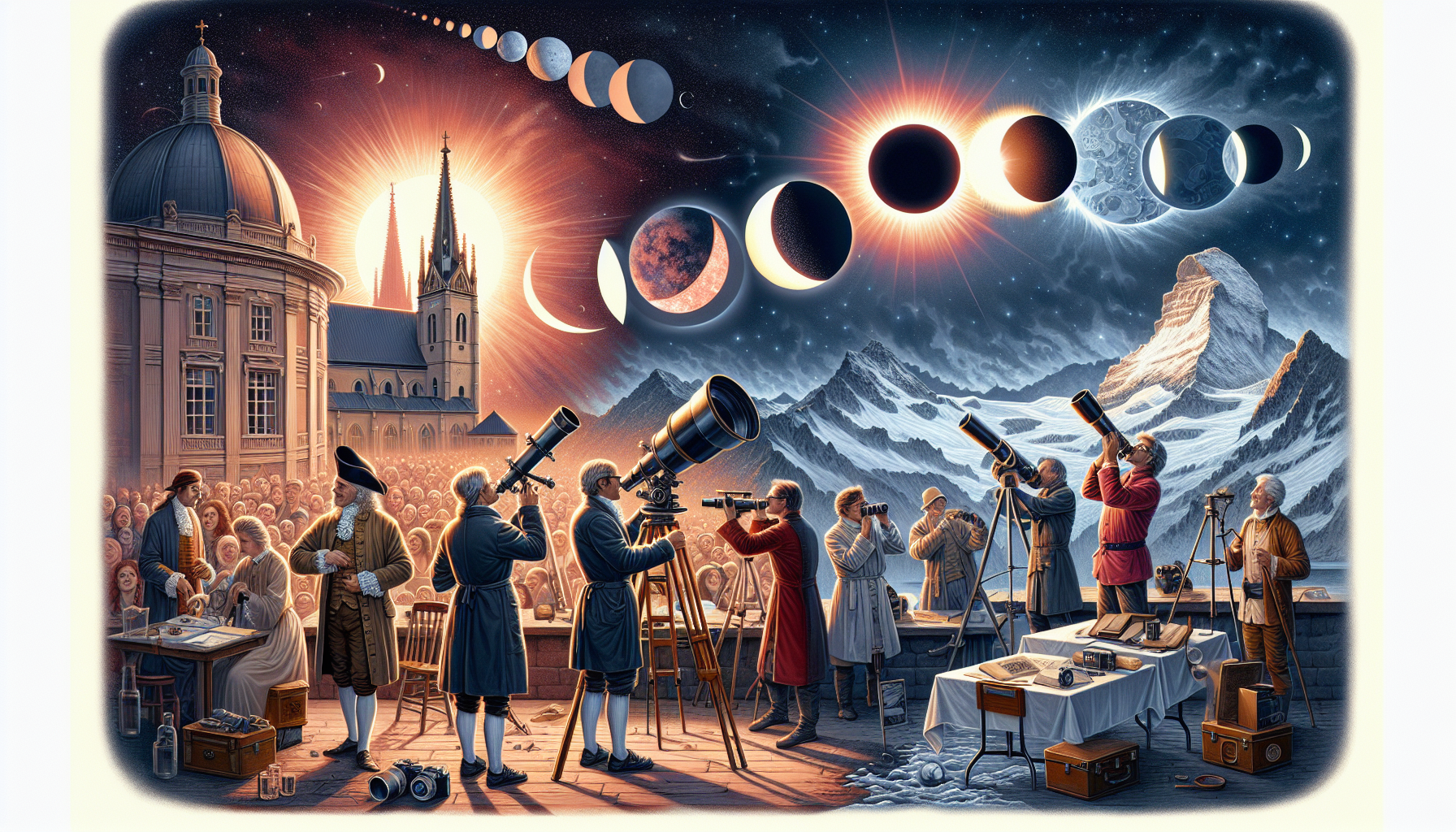Delving into the secrets of celestial events, this article explores the fascinating realm of eclipse prediction, a practice steeped in history, mystery, and science. Ancient civilizations, armed with nothing but keen observations, detailed records, and an unparalleled understanding of celestial mechanics, developed sophisticated methods to predict eclipses. From the Babylonians and Mayans to the ancient Greeks, these civilizations not only foretold the shadows that would fall upon the Earth but also contributed significantly to the foundation of modern astronomy. Through their achievements, we gain insight into the ingenuity and enduring curiosity that have driven humanity’s quest to unlock the mysteries of the cosmos.

The Astronomical Insights of Ancient Babylon
The ancient Babylonians were not only pioneers in many fields, but their ability to predict eclipses stands as a testament to their ingenuity and deep understanding of the heavens. The key to unlocking the secrets of eclipses for these ancient astronomers was the Saros cycle, a period that they meticulously documented and explored to forecast celestial events with astonishing accuracy.
Unlocking the Secrets of the Saros Cycle
The Saros cycle, spanning approximately 18 years, 11 days, and 8 hours, was the cornerstone of Babylonian eclipse prediction. This cycle’s significance lies in its ability to forecast when the Earth, Moon, and Sun would align, leading to either a solar or lunar eclipse.
- Understanding of celestial mechanics
- Documentation of celestial events over centuries
- Precision in predicting future eclipses
Babylonian Eclipse Prediction Techniques
Beyond the Saros cycle, Babylonian astronomers employed detailed observation and record-keeping strategies. They meticulously noted every lunar and solar eclipse, correlating these events with the Saros cycle to refine their predictions. This harmony of empirical evidence and cyclical patterns enabled them to predict eclipses with remarkable precision.
| Event | Predictive Technique | Accuracy Level |
|---|---|---|
| Lunar Eclipses | Saros Cycle Observation | High |
| Solar Eclipses | Empirical Records & Calculations | High |
The art of predicting eclipses was more than a scientific endeavor for the Babylonians; it was a window into the divine, influencing kings and commoners alike. Their ability to foretell these celestial events positioned them as holders of knowledge that seemed almost magical, marrying science and spirituality in a way that was millennia ahead of its time.
The Impact of Babylonian Astronomy
The legacy of Babylonian astronomers is not limited to their eclipse predictions. Their sophisticated understanding of the heavens laid the groundwork for future generations, influencing Greek and Islamic scholars and echoing through the annals of astronomical history. The echoes of their work in predicting eclipses resonate, reminding us of humanity’s everlasting quest to comprehend the cosmos.
- Influence on subsequent astronomical traditions
- Contribution to the scientific method
- The foundational role in the history of astronomy
In the grand tapestry of human history, the ancient Babylonians’ efforts to predict eclipses represent a remarkable blend of science, culture, and mysticism. Their work not only showcases the advanced understanding of celestial mechanics but also highlights the universal human desire to connect with the cosmos.

The Mayans and Their Eclipse Tables
The Mayan civilization, known for its sophisticated understanding of Astronomy, has left behind a legacy that includes some of the most accurate eclipse prediction methods of the ancient world. Among their numerous achievements, the Mayans developed eclipse tables that allowed them to predict solar and lunar eclipses with remarkable precision. These tables, part of their broader effort to harmonize their calendar with celestial events, demonstrate a deep understanding of the cosmos and its cycles.
Decoding the Dresden Codex
The Dresden Codex, one of the most famous Mayan manuscripts, serves as a crucial window into their astronomical practices, particularly regarding eclipses. This ancient document contains detailed eclipse tables that have astounded modern scholars with their accuracy. Despite being centuries old, these tables reflect a profound comprehension of the lunar and solar cycles, enabling the Mayans to forecast eclipses with an exceptional degree of precision.
- The role of the Saros cycle in Mayan eclipse predictions
- Correlation between the Mayan calendar and celestial events
- Integration of eclipse predictions into Mayan culture and ceremonies
Advanced Observational Techniques
Beyond merely documenting celestial patterns, the Mayans engaged in intricate observational practices. They utilized structures aligned with astronomical phenomena to observe the sky, crafting a holistic approach that melded empirical observations with mathematical calculations. This synergy allowed them to refine their predictions over time, embedding the rhythm of eclipses into the cultural and spiritual life of their civilization.
| Celestial Event | Method of Prediction | Societal Impact |
|---|---|---|
| Solar Eclipses | Dresden Codex Analysis | Spiritual and Cultural Rites |
| Lunar Eclipses | Empirical Observation & Calculations | Agricultural Planning |
The Mayans’ ability to predict eclipses was not merely an academic endeavor but played a significant role in their society. Eclipses were seen as powerful omens, influencing agricultural decisions, societal rituals, and the wielding of power. The predictive accuracy provided by their eclipse tables afforded them a means to prepare and align their activities with these celestial events, showcasing the deeply intertwined nature of astronomy and daily life in Mayan culture.
The Legacy of Mayan Astronomy
The astronomical achievements of the Mayans, particularly in the realm of eclipse prediction, remain a testament to their ingenuity and their profound connection to the cosmos. Their methods of predicting eclipses, deeply rooted in observational science and mathematical calculation, laid a foundation that continues to inspire awe and respect. As we delve into the mysteries of the past, the Mayan eclipse tables stand as a enduring reminder of the universal human quest to understand the rhythm of the skies.
- Impact on modern astronomical research
- Influence on the understanding of ancient sciences
- Contribution to the global history of astronomy

The Greeks and the Geometry of Eclipses
The Greeks, with their keen analytical minds, revolutionized the way we understand eclipses through the application of geometry. This sophisticated approach allowed Greek astronomers to predict eclipses with a precision that was unparalleled in the ancient world. Their methods, deeply rooted in observational astronomy and mathematical calculations, have paved the way for modern scientific practices in understanding celestial events.
Thales of Miletus and the Solar Eclipse
Considered one of the earliest recorded instances of Greek eclipse prediction, Thales of Miletus successfully predicted a solar eclipse. By employing geometric principles and understanding the Saros cycle, he was able to forecast this celestial event, causing amazement and fear among those who witnessed it. This remarkable achievement showcased the potential of mathematical astronomy in predicting eclipses and laid the groundwork for future advancements.
- Introduction of geometric principles in astronomy
- Understanding the significance of the Saros cycle
- Thales’s contribution to predictive astronomy
Hipparchus and the Lunar Eclipse
Hipparchus, another prominent Greek astronomer, made significant contributions to eclipse prediction through his meticulous study of the Moon’s motion. His use of the geometric model to calculate the Moon’s orbit and its interaction with the Earth and Sun exemplified the Greeks’ approach to understanding eclipses. Hipparchus’s work in refining the accuracy of lunar eclipse predictions marked a monumental step forward in the field of astronomy.
| Astronomer | Contribution | Impact on Eclipse Prediction |
|---|---|---|
| Thales of Miletus | Prediction of Solar Eclipse | Laid foundational principles |
| Hipparchus | Geometric Model of Lunar Motion | Refined accuracy of predictions |
The Greeks’ ability to predict eclipses was not only a technical achievement but also contributed to the development of astronomy as a science. The transition from a primarily observational practice to one grounded in mathematical and geometric analysis represented a profound shift. This approach enabled them to achieve a deeper understanding of the cosmos and its processes, influencing countless generations of astronomers.
The Legacy of Greek Astronomy
The methodologies developed by Greek astronomers for predicting eclipses have had a lasting impact on the field of astronomy. Their fusion of observation, mathematics, and geometry created a powerful toolset for understanding the universe. The legacy of Greek contributions to eclipse predictions underscores the enduring value of their scientific endeavors, reminding us of the importance of curiosity, rigorous analysis, and the pursuit of knowledge.
- Evolution of modern astronomy
- Influence on subsequent generations of scientists
- The enduring relevance of Greek methods
Eclipse prediction stands out as a remarkable journey through time, illustrating how ancient civilizations combined keen observations, mathematical prowess, and an unwavering curiosity to understand and forecast celestial shadows. The legacy of the Babylonians, Mayans, and Greeks continues to illuminate the path for modern astronomy, offering us invaluable insights into both the universe and our place within it. Their achievements remind us of the universal quest to decode the cosmos, a journey that spans across cultures and millennia. After delving into the mysteries of eclipse prediction, why not put your knowledge to the test? Below, you’ll find a 10-question quiz designed to challenge and expand your understanding of this fascinating subject.







